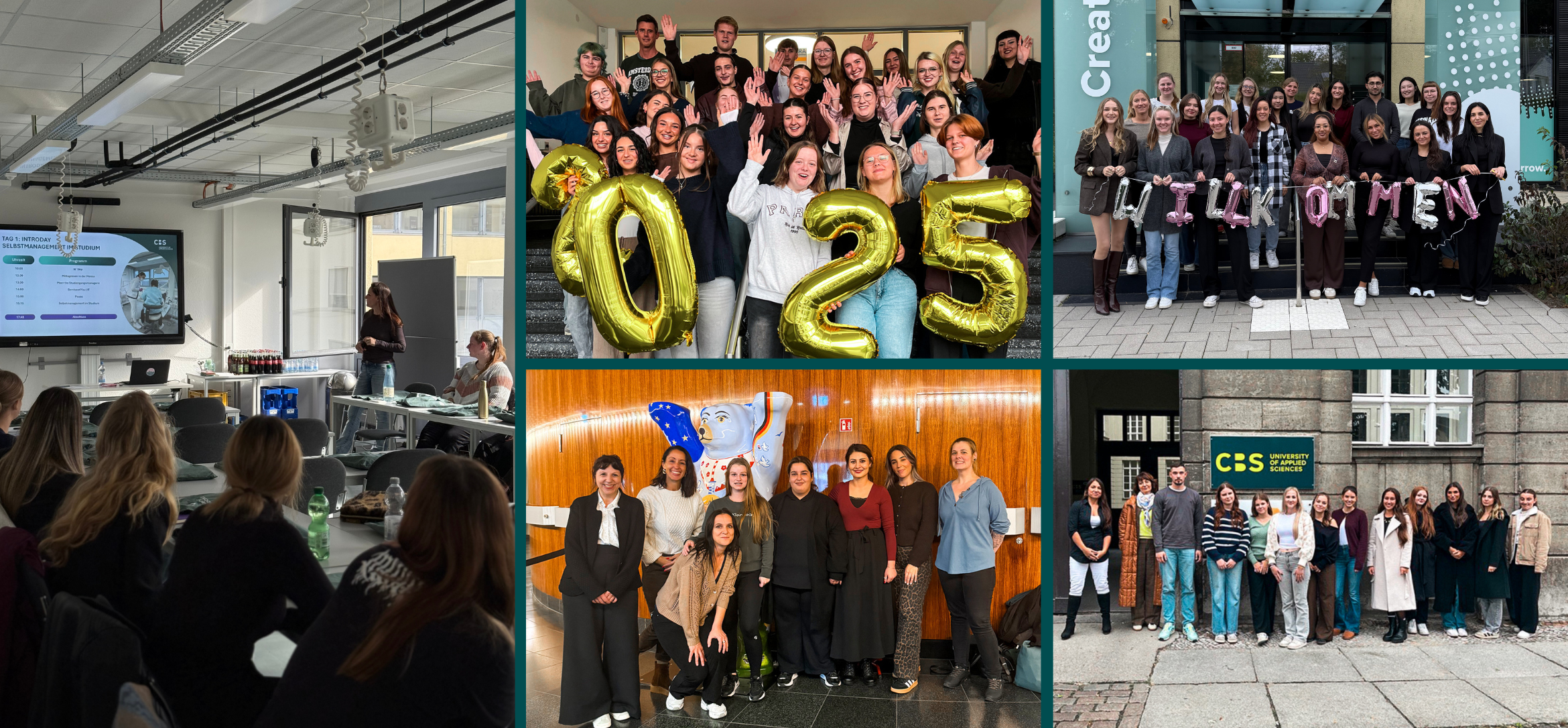
If you’re moving to Germany for your studies, you may want to learn some basic language skills to help you out when you arrive - even if you’ll be studying in English. Although a lot of Germans speak English, you shouldn’t assume that everyone you meet will speak the same language as you. You should try and get at least a few basic phrases under your belt that you can use in your daily life.
It’s also polite to at least try to speak German when meeting new German people!
Learning a new language can be difficult, but if you’re willing to put the time and energy into it, you’ll have no problems at all!
In this guide, we’ll be sharing all of our best tips on how to learn German fast and easy as well as sharing some of our favorite German words that we think everyone should know.
Here is your complete guide to learn German fast
8 Reasons to learn German
Here are some of the top reasons to learn German if you plan on moving here to study - believe us, there are lots of great reasons, but these are just the best!
1 - Access to German universities
Germany is home to some of the top universities in Europe. By learning the German language you’ll be able to attend these universities and receive a high-class education.
A lot of German universities also offer English-taught programmes, but even if you are applying for these programmes, it’s a good idea to learn German if you can.
At CBS, we integrate language classes into our study programmes. So you can study in English and learn German at the same time.
2 - Ease of daily life
You may not think it’s important to learn German if your classes are taught in English and all your friends speak English - but that’s the wrong way to look at it!
Despite speaking English on campus, not everyone you meet outside will speak the same language as you. It will make your daily life a lot easier if you’re able to speak to German people in their own language.
Even things like labels in supermarkets, restaurant menus, or maps might not be in English, so even just having basic German knowledge will make your daily life a lot easier.
Here are 22 tips for living in Germany as an international student
3 - Ability to meet new people
When you study abroad, it’s so easy to make friends with other international students, but don’t forget about the German students too!
Some German students may not feel confident socialising in English, so don’t lose out on making a new friend just because you can’t speak German.
4 - Important for when you need help
Having some basic German language skills will come in very useful in situations when you’re trying to ask for help, or trying to complete essential tasks during your studies.
For example, it’s important to learn some basic phrases that could come in useful when you’re at the supermarket, or trying to register your address as part of your residence permit application.
5 - Travelling around the EU
German is the most widely spoken language in the EU after English, so having some language skills means you have more chance of being able to converse with people in other countries who may not be able to speak English.
Check out our undergraduate degrees
Check out our graduate degrees
6 - Professional opportunities
If you plan to stay in Germany after your study programme to find a job, speaking German will make you stand out from the crowd - even if the company you’re applying to work in English.
There are lots of career opportunities in Germany for international students, and speaking some German will allow you to take advantage of these opportunities.
7 - Gives a good impression
When it comes to applying for an undergraduate or postgraduate degree, or job in Germany, showing initiative and learning a language by yourself will put forward a really good first impression of yourself.
By learning a language, you’ve shown ambition and determination - something that Universities and many companies will look for in applicants.
8 - German culture
Germany is known for its famous literary culture, and although you can read the translated works of authors like Johann Wolfgang von Goethe, Herman Hesse, Franz Kafka, it’s much better to be able to read them in their original language.
Is it hard to learn German?
Like learning any other language, it will take a lot of time and patience to become fluent in German.
The German language can be daunting as it’s quite different from English - there are male and female forms of words, compound words, and different linguistic rules to remember. However, German is very similar to other European languages like French or Italian.
If you start by mastering the basics, and then consistently expand on your knowledge, you’ll be able to pick up conversations and understand German very quickly.
The best way to learn German is a mixture of studying, with a tutor or online, and then real-life practice.
How long does it take to learn German?
There is no fixed answer to that question. The time it takes to learn German is different for every person, and will mainly depend on the prior knowledge, amount of time, exposure to the language, practice you put into it, and motivation.
Most people find that within six months they'll be able to have small talk and daily conversations and doing easy things like ordering food, making a short phone call, etc. Within 2-3 years of studying, they’ll be able to work in German.
At CBS we provide German lessons as part of all our study programmes to help students pick up the language quicker and improve their skills. In our programmes, students will have 2 German classes a week which each last for 75 minutes. So by the time you finish your bachelor's after 3 years or your master's after 2, you should be fluent enough to work in German. (If you really focus on learning German within these years).
How many words do you need to be fluent in German?
Once you know around 10,000 words in German, you will be considered fluent.
Check out our undergraduate degrees
Check out our graduate degrees
German alphabet & grammar
The German alphabet and grammar can seem complicated, but once you learn the rules and how to use the letters it’s very simple and logical.
The German alphabet contains 26 standard letters, like the English alphabet, but has 1 additional letter, ‘ß’, and can use different variations of the vowels.
The variations of the vowels are used when an Umlaut (a pair of dots) are placed over a, o, and u to make ä, ö, ü.
The main point of German grammar to know is that all nouns are given a gender; masculine, feminine, or neutral. These genders were developed to make it clearer what’s being referred to in communication.
You should always use a noun’s gender before the noun, so as you learn new German nouns, it’s important to learn the gender too.
To identify the gender of a noun when communicating, you use the 3 forms of “the” - der, die, and das. For example:
- der Stuhl - the stool (masculine)
- die Tabelle - the table (feminine)
- das Messer - the knife (neutral)
If you’re not sure of what the gender of a noun you’ve learned is, you can figure it out by checking the ending of the noun. Below you’ll find some of the common endings for the different genders for nouns.

How to learn German fast - 7 useful tips
If you're able to put enough time and effort into learning German, it’s possible to become fluent very quickly.
Here are some of our tips on how you can learn German fast and easy:
1 - Go out of your way to speak to German people
The best way to learn German is by speaking to Germans, so talk to as many people as you can - and visit the country if you’re able to.
A lot of the time when you’re learning a language, you may not really be learning how the everyday person actually speaks - there are lots of words and phrases that you simply won’t learn unless you interact with German people.
2 - Watch German content with subtitles
Watch German videos or movies with English subtitles initially, then switch to German subtitles as you progress. This can improve your listening skills and help you understand context and pronunciation.
3 - Immerse yourself in German
Try and immerse yourself in the German language as much as you can when you’re learning.
You can do this by watching German movies and TV shows, using German subtitles over English-speaking shows, reading German books, or listening to German music.
The best way to immerse yourself is of course to live and study in Germany. Here you would have the chance to practice the language on a daily basis.
4 - Start with the basics
You don’t need to rush ahead when learning a language, start by becoming an expert on basics like the alphabet and simple words and phrases first.
Once you’ve mastered the basics, you can start expanding your knowledge. You can actually start to learn new words even before you know exactly how to use them properly.
5 - Learn the basic grammar rules early on
If you’re not speaking with correct grammar, people might find it hard to understand you so make sure to learn the key rules as soon as you can in your studies - especially focussing on the different genders if your native language doesn’t use these.
6 - Start constructing sentences and phrases
Once you’ve learned basic words, start constructing sentences and phrases with them that you can use in daily life.
At first, they can be very basic, and once you learn more words and rules they will start to become more complex.
7 - Learn Modal Verbs
One of the hardest things in German is the number of declensions and conjugations. Of course, learning all forms for every verb can be exhausting, and very time-consuming. The 7 modal verbs in German can be the holy solution for that.
When used in sentences, these modal verbs take the place of the verb, pushing the verb to the end of the sentence in the infinitive form. This helps you in learning and speaking German faster because using these verbs allows you to use many verbs without knowing their conjugation.
The 7 modal verbs are the following:
- können (can)
- wollen (want)
- sollen (should)
- dürfen (may/be allowed to)
- müssen (must)
- möchten (would like)
- mögen (like)
{{call-to-action}}
The 3 best apps to learn German
If you don’t have the time or money to sign up for language classes, downloading a language app can be a good idea to help you learn German.
By using apps you can learn a language at a time that suits you from your phone or computer.
Here are some of the best apps to learn German:
Duolingo
Duolingo is the most popular free language app that teaches German through fun, game-like activities.
You can also track your learning, set up reminders to complete daily activities, and get in-app rewards for when you move through the different levels.
Babbel
Babbel uses 10-15 minute activities to help you learn German. All of the activities are interactive and include images, games, etc. that make learning a language fun.
Babbel also has live features so you can video call language teachers and get real-time feedback on what you’ve learned.
There is a small subscription fee, around €12 a month, to use Babbel - which is still a lot less than typical language classes would cost.
Busuu
Busuu is a free and easy-to-use app that’s perfect for busy people as you only need to do 10 minutes a day.
With Busuu, the important thing is consistency and practice. You may learn slowly, but you’ll be surprised by how much you’ll learn over just a few weeks.
Common German words and basic phrases
If you don’t know any German, here are some of the most basic phrases you’ll need on a daily basis when living in Germany.
- Hello - Hallo
- Bye - Tschüss
- Please - Bitte
- Thanks - Danke
- Excuse me - Entschuldigung
- How are you - Wie geht’s?
- Sorry - Sorry
- Can you help me? - Können Sie mir helfen? (formal) / Kannst Du mir helfen? (informal)
- Do you speak English? - Sprechen Sie English? (formal) / Sprichst Du Englisch? (informal)
Funny German words and phrases
There are a lot of German words and phrases that are pretty funny when translated literally into English, here are some of our favourites:
- Sitzfleisch (sit or seat meat): When you’re able to sit through a particularly boring meeting
- Dreikäsehoch (three cheeses high): A word for people who are very short, usually only used for young children
- Leben ist kein Ponyhof (life is no pony farm): Life can be challenging
- Innerer Schweinehund (Inner pig dog): The inner voice that encourages you to be lazy
- Kummerspeck (Grief bacon): Weight that you put on after a period of sadness
Weird German words and phrases
There’s also a lot of German words that may seems a bit weird, here are some of our favourites:
- Ohrwurm (Ear worm) : The word for when you have a song stuck in your head
- Weltschmerz (World pain): When the world doesn’t live up to your expectations
- Backpfeifengesicht (slap face): Someone who needs a slap in the face
- Kopfkino (head cinema): When you mentally play scenes inside your head
- Jetzt haben wir den Salat (Now we have the salad): When everything has turned out to be a mess
- Luftschloss (Air castle) : An idea that probably won’t happen
Longest German word
At a huge 80 letters, the longest word in German is Donaudampfschifffahrtselektrizitätenhauptbetriebswerkbauunterbeamtengesellschaft which basically translate to Association for Subordinate Officials of the Main Maintenance Building of the Danube Steam Shipping Electrical Services. Wooof that was a lot!
Conclusion
We hope that this article gave you all of the basic information you need to start learning the German language.
Don’t worry if you don’t pick up the language straight away, it often takes time and effort to learn German so you shouldn’t be discouraged if you think you’re slow.
Learn about the requirements to study in Germany and how to apply
And remember, if you’re coming to CBS, you can always continue your language lessons when you arrive - we incorporate language classes into all of our study programmes. Why waste 2 years of your life studying a language in order to pursue a degree afterward. At CBS you can have the best of both worlds, by studying in English and learning German at the same time.
Master German While You Study!
Unlock new opportunities with German proficiency!
At CBS, we integrate German language courses into all our study programs, allowing you to study in English while mastering German. This gives you a head start in your career and daily life in Germany.
Study in English – Learn German on the side
Improve your career prospects in Germany
Gain confidence in daily conversations
Fast-Track Your German Learning!
Want to speak German fluently while studying?
CBS makes it easy! With integrated German classes, you’ll learn the language alongside your degree – so by the time you graduate, you’ll be ready to work, network, and live like a local in Germany.
Why wait? Start learning German today!
Weekly German classes included
Practical language skills for real-life situations
Study in an international environment
















